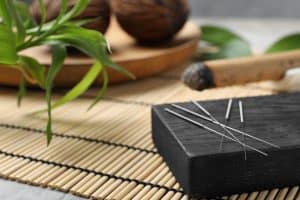Herbal Remedies and Acupuncture for Addiction Recovery
 Traditional Chinese medicine revolves around herbal remedies and acupuncture for addiction recovery. Might these ancient therapies be successfully used in modern addiction treatment? Chinese and American researchers studied the existing evidence and concluded that, although more testing is need, some traditional remedies can compliment modern medicine for promoting addiction recovery (Lu et. al., 2009).
Traditional Chinese medicine revolves around herbal remedies and acupuncture for addiction recovery. Might these ancient therapies be successfully used in modern addiction treatment? Chinese and American researchers studied the existing evidence and concluded that, although more testing is need, some traditional remedies can compliment modern medicine for promoting addiction recovery (Lu et. al., 2009).
What We Know
The research team examined texts and computerized literature concerning treatment and neurobiology of herbal medicines as well as acupuncture for drug abuse and dependence. They found that acupuncture showed evidence for clinical efficacy in opiate withdrawal, but it showed poor efficacy for alcohol and nicotine withdrawal and relapse prevention. No large studies support the efficacy of acupuncture for cocaine addiction in well-designed clinical trials.
Clinical trials for herbal remedies have been rare. Made from the root of the kudzu plant, Radix puerariae (also known as pueraria root or ge gun) showed the most promise as an alcohol treatment. Radix puerariae acted through the isoflavone daidzin to inhibit alcohol metabolism and produce disulfiram-like effects. Peyote (which contains the psychoactive alkaloid mescaline) showed some evidence as an alcohol treatment among Native Americans.
How Does it Work?
Thunbergia laurifolia (also known as blue trumpet vine and laurel clock vine) can protect against alcohol liver toxicity. In Thailand, Thunbergia laurifolia has been used to treat drug addiction, and one study showed that the herb significantly increases neuronal activity in specific brain regions in rats that are responsible for reward and locomotor behavior (Thongsaard 2005). Similar neuronal activity has been previously reported after cocaine or amphetamine administration.
Although Withania somniferous (also known as Indian ginseng or Ashwagandha) and Salvia miltiorrhiza (red sage, Chinese sage, or dan shen) have no efficacy data, animal models show that Withania somniferous can reduce morphine tolerance, and Salvia miltiorrhiza can reduce alcohol intake.
Ginseng and kava lack efficacy to date in addiction treatment, and researchers note that kava can be hepatotoxic (it may cause liver damage).
What the Study Says About Herbal Remedies and Acupuncture for Addiction Recovery
This study suggests that traditional herbal treatments and acupuncture can compliment modern medicine for addiction treatment. Traditional remedies may help with drug withdrawal and possibly relapse prevention, and they are generally less expensive with fewer side effects (with the noted exception of kava). When used as adjuncts to pharmacotherapy, herbal remedies and acupuncture may reduce the dosage and duration of pharmaceutical treatments.
For individuals seeking to support their addiction recovery using a broad range of supports, herbal treatments and acupuncture seem worth considering. Because so little is known about how addiction recovery actually occurs, people seeking recovery should be encouraged to explore all possible avenues. The primary caution is safety. Those taking herbal remedies would do well to seek appropriate professional consultation, as well as do their own research.
Lu L, Liu Y, Zhu W, Shi J, Liu Y, Ling W, Kosten TR. Traditional medicine in the treatment of drug addiction.American Journal of Drug and Alcohol Abuse. 2009; 35(1): 1-11.
Thongsaard W, Marsden CA, Morris P, Prior M, Shah YB. Effect of Thunbergia laurifolia , a Thai natural product used to treat drug addiction, on cerebral activity detected by functional magnetic resonance imaging in the rat.Psycholpharmacology. 2005; 180(4): 1-9.
